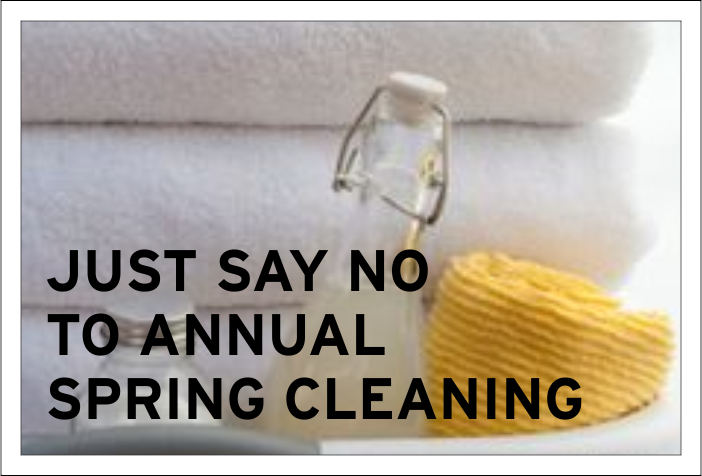Spring cleaning… why are we inside when it’s finally so glorious outside? Because, at the onset of spring each year, we get slammed with “Clean up, organize and reset your life” from all angles. Do these annual articles actually help? We all know the stories all share one fatal flaw, aside from the fact that they relate to housework. They give you the SAME yearly Pavlovian response, sending you out to buy every cleaning agent possible and even more bins or shelves to hold your stuff. Since we do this yearly, can we all agree that it’s NOT working?
This year, think about spring cleaning your mind rather than simply cleaning your home. Revitalizing your hibernating home by reshaping your mind will take dedicated effort, but the result of embracing a more conscious lifestyle will make the effort well worth it. You’ll be freeing up space (that’s both mental and physical space) for new opportunities, challenges and healthier habits. Following the suggestions below might just reshape the way you lead your daily life, but most certainly, each will save you money, save you time, save your health and will have you taking better care of our planet:
Become a mix master.
You know that you can clean every bit of your home with ingredients from your kitchen, right? By making your own products, you reduce waste using reusable containers and not re-purchasing products on a regular basis. Consider the label, the glue, the packaging and the shipping you avoid! This trumps any “green” cleaner on the market and stops you from guessing if it’s really “eco” or is just marketed that way. And what about disposing of the conventional, toxic stuff? Toronto offers a remarkable service — free pickup of your household hazardous waste (cleaning chemicals qualify) via the Toxic Taxi (consider this — stores can sell this stuff for cleaning and homes, but it’s too toxic to throw out). Please check your local municipalities for the safest disposal options.
Just say no.
Kick your disposable habit. Even if it says biodegradable or compostable, a reusable is still much better to swap in for the trashy one. Invest in a few great reusables that you trust, and you’ll wonder why you didn’t do this sooner!
Develop picky eating habits.
If farmers spray their crops with toxic stuff to keep pests and rodents away, why would you want to eat it? Shop your local farmers’ markets, local neighbourhood markets with a commitment to a sustainable food culture, and if you are in a grocery store, shop the outer perimeter (where the fresh stuff is) and buy local organics. Look at the cost of a large container of something organic versus individually portioned conventional ones before deciding that organic is too expensive. Most certainly avoid products with refined sugars, and products that contain high-fructose corn syrup, msg, hydrogenated fats and preservatives. Better for you, and better for all of us.
Realize that if it’s on you, it’s in you.
Not to freak you out or anything, but we apparently absorb 60 per cent of what we put onto our skin. Think about all of the ingredients in all of the products you slather on each day. It’s like your own personal laboratory, and there is no reason your body should be the test tube! Also, realize that the products wash down our drains into our shared water system and inevitably back up our food chain. Given that there are many easily accessible options on the market now, buy something responsible. Just make sure to read the label first. If you can’t pronounce it, or don’t know what it is, avoid it.
Become the biggest snob you can be.
Proclaim “Not in my cart.” It’s good to be very discriminating because labels can be deceiving, especially since claims such as organic, natural, eco and green are not regulated. Bright toys with lead paints, toothpaste with pesticides, plastics with hormone disruptors and foods with toxic chemicals are all reminders that items that we consider to be ordinary can be unsafe. With everything you purchase, you are voting with your dollars, so please make the right choice and you’ll be sending the manufacturers and retailers a clear message about what we want on our store shelves.
Our minds are much like our homes. They can both be easily cluttered with our ideas, attitudes and influences. Our minds need a routine cleaning out of the stuff that we are holding onto out of habit, laziness, or just uncertainty. They also need an infusion of new, exciting and inspiring ideas and attitudes. So, get reshaping in addition to reducing, reusing and recycling… and then help to remind others they can do the same.


